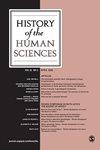土耳其的种族人类学与科学知识形成中的跨国纠缠:Seniha Tunakan的学术轨迹,1930 - 1970
IF 0.5
2区 历史学
Q2 HISTORY & PHILOSOPHY OF SCIENCE
引用次数: 1
摘要
本文将Seniha Tunakan(1908-2000)的学术生活轨迹置于人类学作为一门学科在土耳其的发展及其在两次世界大战之间直至20世纪下半叶与欧洲的跨国联系中。依托马克斯-普朗克协会、Humboldt-Universität祖柏林档案馆、Auswärtigen Amtes德国政治档案馆和土耳其共和国总理档案馆的档案,它重点介绍了Seniha Tunakan在德国的博士研究,以及她在第三帝国首都作为女性博士研究员的生活,以及她回到土耳其后的整个研究生涯。通过Tunakan的职业生涯,文章还分析了德国种族科学在土耳其背景下的延续,揭示了凯撒·威廉人类学、人类遗传和优生学研究所(Kaiser Wilhelm Institute for Anthropology, Human genetic and Eugenik)的成功及其跨国影响。本文章由计算机程序翻译,如有差异,请以英文原文为准。
Racial anthropology in Turkey and transnational entanglements in the making of scientific knowledge: Seniha Tunakan’s academic trajectory, 1930s–1970s
This article situates the trajectory of the academic life of Seniha Tunakan (1908–2000) within the development of anthropology as a scientific discipline in Turkey and its transnational connections to Europe during the interwar period and up until the second half of the 20th century. Relying on the archives of the Max-Planck-Gesellschaft, the archive of the Humboldt-Universität zu Berlin, the Politisches Archiv des Auswärtigen Amtes in Germany, and the Prime Ministry's Republican Archives in Turkey, it focuses on the doctoral studies of Seniha Tunakan in Germany and her life as a female PhD researcher in the capital of the Third Reich, as well as her entire research career after her return to Turkey. Through Tunakan's career, the article also provides an analysis of the perpetuation of German race science in the Turkish context, shedding light upon the success of the Kaiser-Wilhelm-Institut für Anthropologie, menschliche Erblehre und Eugenik (Kaiser Wilhelm Institute for Anthropology, Human Heredity, and Eugenics) and its transnational impact.
求助全文
通过发布文献求助,成功后即可免费获取论文全文。
去求助
来源期刊

History of the Human Sciences
综合性期刊-科学史与科学哲学
CiteScore
1.60
自引率
11.10%
发文量
31
审稿时长
>12 weeks
期刊介绍:
History of the Human Sciences aims to expand our understanding of the human world through a broad interdisciplinary approach. The journal will bring you critical articles from sociology, psychology, anthropology and politics, and link their interests with those of philosophy, literary criticism, art history, linguistics, psychoanalysis, aesthetics and law.
 求助内容:
求助内容: 应助结果提醒方式:
应助结果提醒方式:


